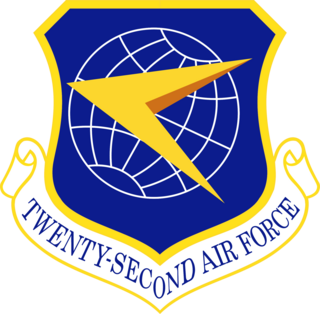
Twenty-Second Air Force is a Numbered Air Force component of Air Force Reserve Command (AFRC). It was activated on 1 July 1993 and is headquartered at Dobbins Air Reserve Base, Georgia.

The 513th Air Control Group is an Air Reserve Component unit of the United States Air Force. It is assigned to the Tenth Air Force, Air Force Reserve Command, and is stationed at Tinker Air Force Base, Oklahoma.

The 459th Airlift Squadron is part of the 374th Airlift Wing at Yokota Air Base, Japan. It operates the UH-1N Iroquois and the C-12J Huron aircraft, performing passenger transport, aeromedical evacuation and search and rescue missions.

The 156th Airlift Squadron is a unit of the North Carolina Air National Guard 145th Airlift Wing. It is assigned to Charlotte Air National Guard Base, North Carolina and is equipped with the Boeing C-17 Globemaster III aircraft.

The 148th Fighter Squadron is a unit of the Arizona Air National Guard 162d Fighter Wing located at Tucson Air National Guard Base, Arizona. The 148th is equipped with the Block 20 F-16A/B Fighting Falcon. The squadron was first organized in England during World War II, moving to North Africa shortly after the invasion. It participated in combat in the Mediterranean Theater of Operations, where it earned a Distinguished Unit Citation. The squadron returned to the United States after V-E Day and was inactivated.

The 195th Fighter Squadron is a unit of the Arizona Air National Guard 162d Fighter Wing located at Tucson Air National Guard Base, Arizona. The 195th is equipped with the F-16 Fighting Falcon.
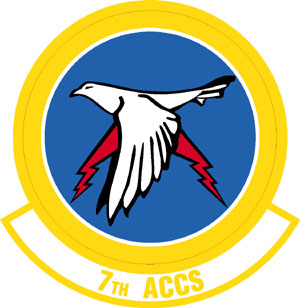
The 7th Expeditionary Airborne Command and Control Squadron is part of the 379th Air Expeditionary Wing at Al Udeid Air Base, Qatar. It operates the E-8 Joint STARS aircraft, conducting airborne command and control missions. The squadron has performed the airborne command and control mission since 1968, when it was activated in Vietnam. In 1985, the squadron was consolidated with three earlier units: The 7th Ferrying Squadron, which helped deliver aircraft to the Soviet Union from 1942 until 1944; the 7th Combat Cargo Squadron, which performed combat airlift missions in the Southwest Pacific Theater from 1944 until V-J Day, then became part of the Occupation Forces in Japan until inactivating in 1948; and the 7th Air Transport Squadron, Special, which provided airlift support for the United States' special weapons program from 1954 to 1966.

The 11th Airlift Squadron is an inactive United States Air Force unit. It was most recently part of the 375th Airlift Wing as Scott Air Force Base, Illinois. It operated McDonnell Douglas C-9 Nightingale aircraft conducting medical evacuation missions.
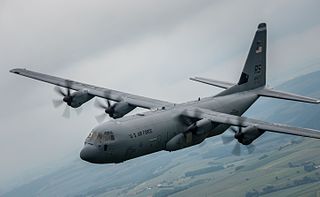
The 86th Operations Group is the flying operational component of the 86th Airlift Wing, United States Air Force. The group is stationed at Ramstein Air Base, Germany.

The 60th Operations Group is a United States Air Force unit assigned to the 60th Air Mobility Wing. It is stationed at Travis Air Force Base, California.

The 315th Operations Group is a United States Air Force Reserve unit assigned to the 315th Airlift Wing. The unit is stationed at Charleston Air Force Base, South Carolina. The 315th Group controls all operational McDonnell Douglas C-17 Globemaster III flying squadrons of the 315th Airlift Wing. It was activated in 1992, when Air Force Reserve Command implemented the Objective Wing organization.

The 439th Operations Group is an active United States Air Force Reserve unit. It is the flying component of the Twenty-Second Air Force 439th Airlift Wing, stationed at Westover Air Reserve Base, Massachusetts.

The 332d Airlift Flight is an inactive United States Air Force unit. it was first organized in India in 1944 as the 11th Combat Cargo Squadron. As the 332d Troop Carrier Squadron it remained in China through 1947. The squadron was activated again for the Berlin Airlift from 1948 to 1949.
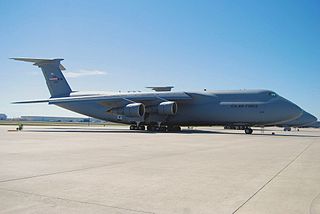
The 433rd Operations Group is the operational flying component of the United States Air Force Reserve 433rd Airlift Wing. It is stationed at Lackland Air Force Base, Texas.
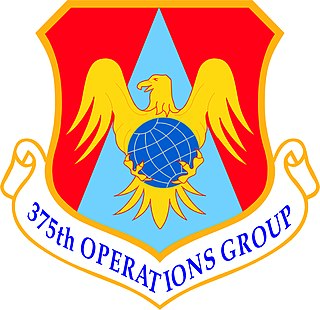
The 375th Operations Group is the operational flying component of the United States Air Force 375th Air Mobility Wing. It is stationed at Scott Air Force Base, Illinois.

The 374th Operations Group is the operational flying component of the United States Air Force 374th Airlift Wing. It is stationed at Yokota Air Base, Japan.

The 541st Bombardment Squadron is the former name of the 541st Special Operations Squadron, an inactive United States Air Force (USAF) unit. During World War II the 541st served as a heavy bomber training unit until inactivated in a general reorganization of Army Air Forces training units. The squadron was redesignated in 1985, when it was consolidated with two other units.

The 317th Operations Group is an inactive United States Air Force unit, last stationed at Pope Air Force Base, North Carolina as part of Air Mobility Command. It was activated in 1992 during the Air Force's Objective Wing reorganization, and inactivated the following year when all Air Force units at Pope were assigned to the 23d Wing.

The 13th Aeromedical Airlift Squadron is an inactive unit of the United States Air Force, last stationed at Travis Air Force Base. The squadron's first predecessor was the 13th Combat Cargo Squadron, which flew men and material in the China Burma India Theater during World War II. That squadron was disbanded in 1948, but was reconstituted in 1985 and consolidated with the unit's second predecessor.
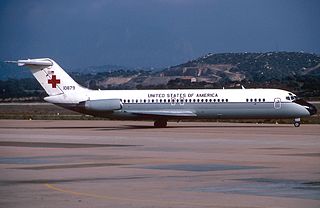
The 55th Aeromedical Airlift Squadron is an inactive United States Air Force unit. It was first activated during World War II as the 55th Ferrying Squadron. It deployed to Canada and managed a station on the ALSIB ferrying route.
























